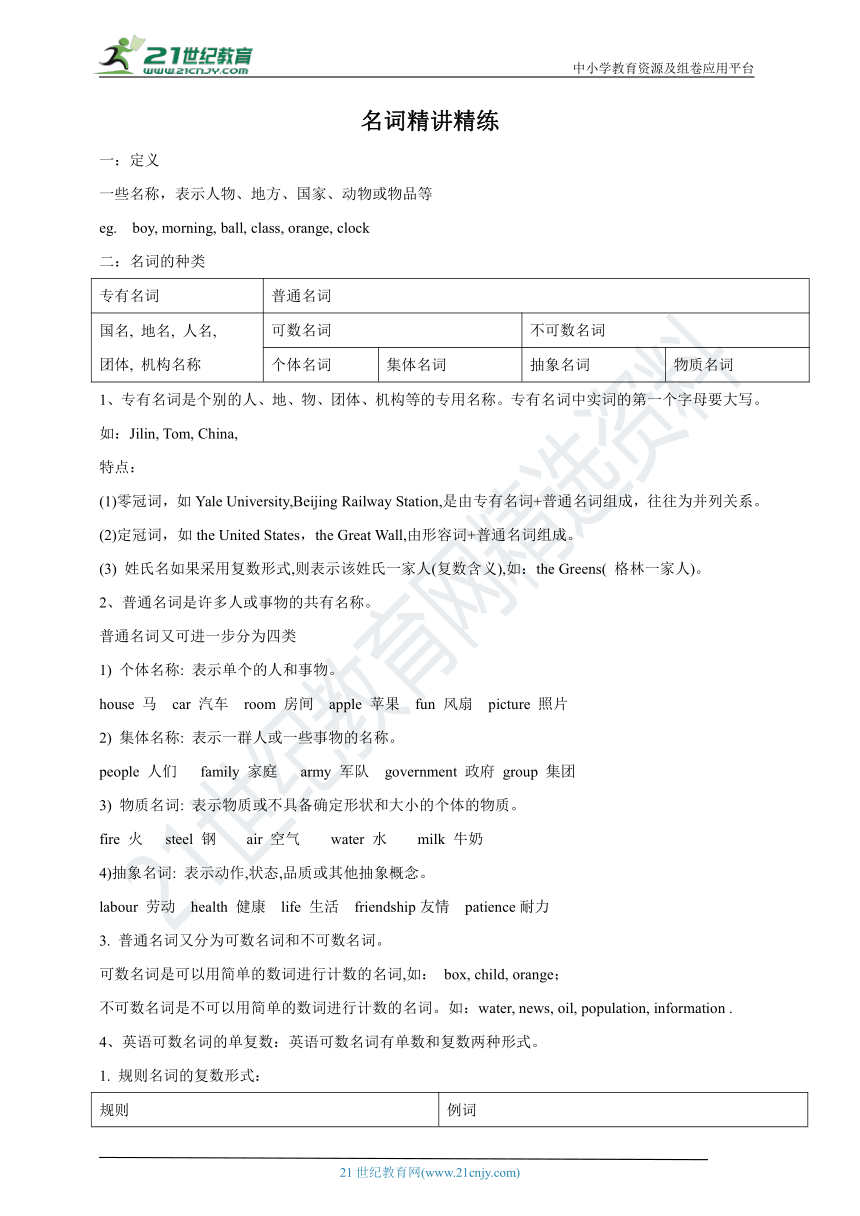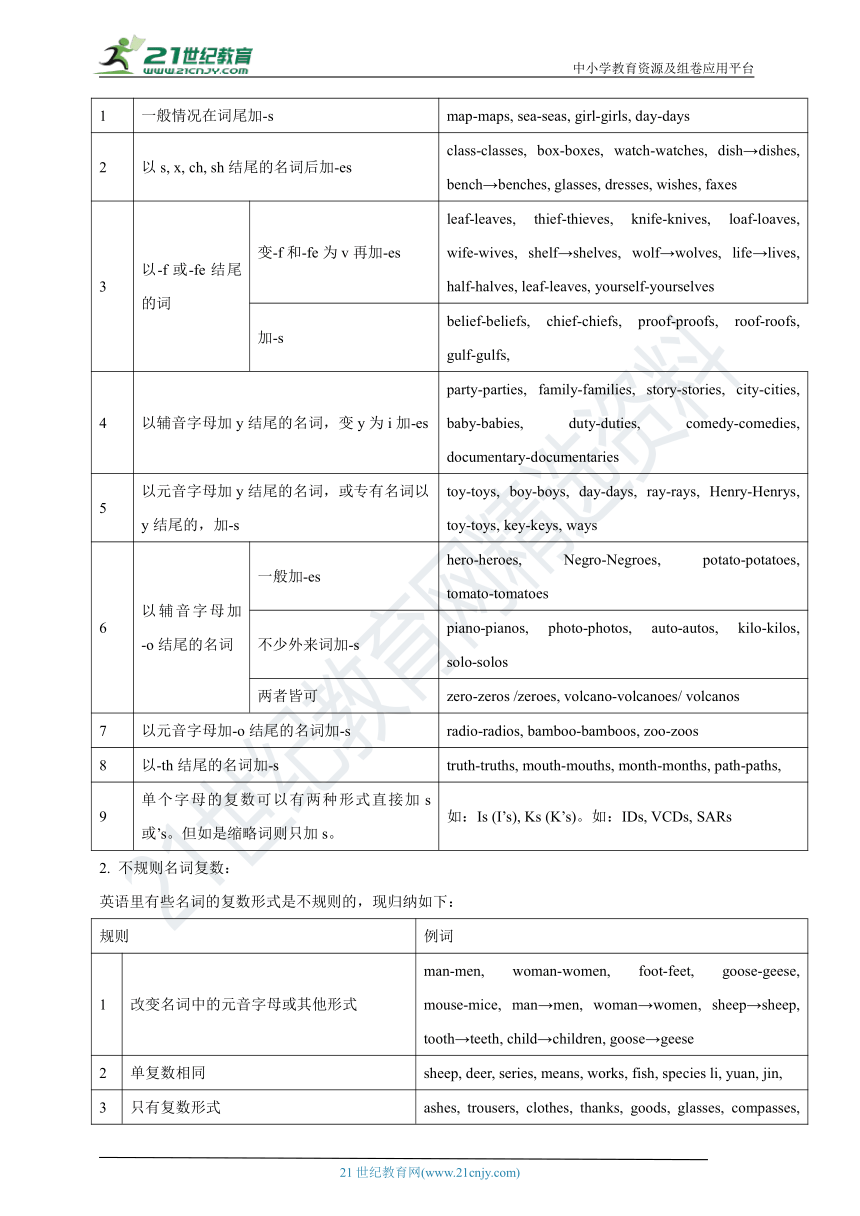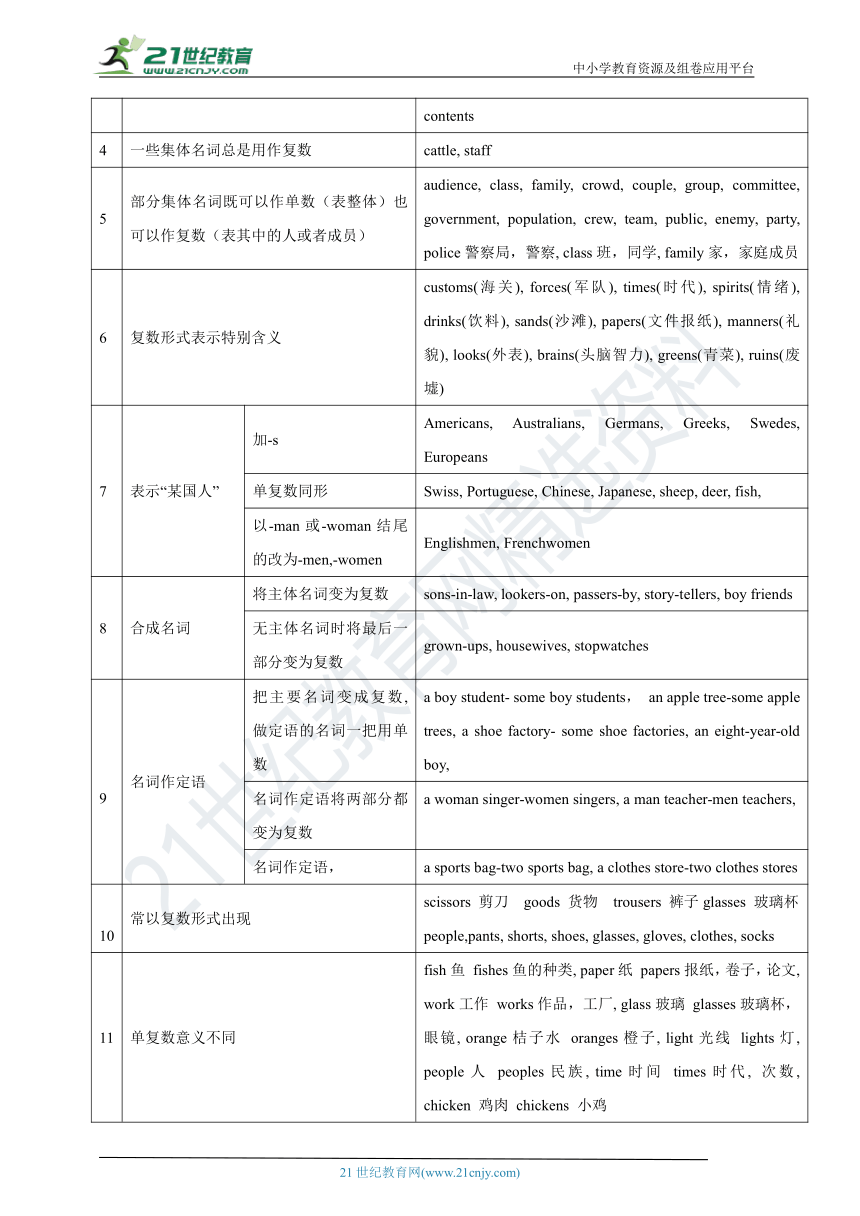2022年中考英语二轮语法专题精讲学案:名词
文档属性
| 名称 | 2022年中考英语二轮语法专题精讲学案:名词 |

|
|
| 格式 | zip | ||
| 文件大小 | 977.0KB | ||
| 资源类型 | 试卷 | ||
| 版本资源 | 通用版 | ||
| 科目 | 英语 | ||
| 更新时间 | 2021-12-02 17:30:01 | ||
图片预览



文档简介
中小学教育资源及组卷应用平台
名词精讲精练
一:定义
一些名称,表示人物、地方、国家、动物或物品等
eg. boy, morning, ball, class, orange, clock
二:名词的种类
专有名词 普通名词
国名, 地名, 人名, 团体, 机构名称 可数名词 不可数名词
个体名词 集体名词 抽象名词 物质名词
1、专有名词是个别的人、地、物、团体、机构等的专用名称。专有名词中实词的第一个字母要大写。如:Jilin, Tom, China,
特点:
(1)零冠词,如Yale University,Beijing Railway Station,是由专有名词+普通名词组成,往往为并列关系。
(2)定冠词,如the United States,the Great Wall,由形容词+普通名词组成。
(3) 姓氏名如果采用复数形式,则表示该姓氏一家人(复数含义),如:the Greens( 格林一家人)。
2、普通名词是许多人或事物的共有名称。
普通名词又可进一步分为四类
1) 个体名称: 表示单个的人和事物。
house 马 car 汽车 room 房间 apple 苹果 fun 风扇 picture 照片
2) 集体名称: 表示一群人或一些事物的名称。
people 人们 family 家庭 army 军队 government 政府 group 集团
3) 物质名词: 表示物质或不具备确定形状和大小的个体的物质。
fire 火 steel 钢 air 空气 water 水 milk 牛奶
4)抽象名词: 表示动作,状态,品质或其他抽象概念。
labour 劳动 health 健康 life 生活 friendship友情 patience耐力
3. 普通名词又分为可数名词和不可数名词。
可数名词是可以用简单的数词进行计数的名词,如: box, child, orange;
不可数名词是不可以用简单的数词进行计数的名词。如:water, news, oil, population, information .
4、英语可数名词的单复数:英语可数名词有单数和复数两种形式。
1. 规则名词的复数形式:
规则 例词
1 一般情况在词尾加-s map-maps, sea-seas, girl-girls, day-days
2 以s, x, ch, sh结尾的名词后加-es class-classes, box-boxes, watch-watches, dish→dishes, bench→benches, glasses, dresses, wishes, faxes
3 以-f或-fe结尾的词 变-f和-fe为v再加-es leaf-leaves, thief-thieves, knife-knives, loaf-loaves, wife-wives, shelf→shelves, wolf→wolves, life→lives, half-halves, leaf-leaves, yourself-yourselves
加-s belief-beliefs, chief-chiefs, proof-proofs, roof-roofs, gulf-gulfs,
4 以辅音字母加y结尾的名词,变y为i加-es party-parties, family-families, story-stories, city-cities, baby-babies, duty-duties, comedy-comedies, documentary-documentaries
5 以元音字母加y结尾的名词,或专有名词以y结尾的,加-s toy-toys, boy-boys, day-days, ray-rays, Henry-Henrys, toy-toys, key-keys, ways
6 以辅音字母加-o结尾的名词 一般加-es hero-heroes, Negro-Negroes, potato-potatoes, tomato-tomatoes
不少外来词加-s piano-pianos, photo-photos, auto-autos, kilo-kilos, solo-solos
两者皆可 zero-zeros /zeroes, volcano-volcanoes/ volcanos
7 以元音字母加-o结尾的名词加-s radio-radios, bamboo-bamboos, zoo-zoos
8 以-th结尾的名词加-s truth-truths, mouth-mouths, month-months, path-paths,
9 单个字母的复数可以有两种形式直接加s或’s。但如是缩略词则只加s。 如:Is (I’s), Ks (K’s)。如:IDs, VCDs, SARs
2. 不规则名词复数:
英语里有些名词的复数形式是不规则的,现归纳如下:
规则 例词
1 改变名词中的元音字母或其他形式 man-men, woman-women, foot-feet, goose-geese, mouse-mice, man→men, woman→women, sheep→sheep, tooth→teeth, child→children, goose→geese
2 单复数相同 sheep, deer, series, means, works, fish, species li, yuan, jin,
3 只有复数形式 ashes, trousers, clothes, thanks, goods, glasses, compasses, contents
4 一些集体名词总是用作复数 cattle, staff
5 部分集体名词既可以作单数(表整体)也可以作复数(表其中的人或者成员) audience, class, family, crowd, couple, group, committee, government, population, crew, team, public, enemy, party, police警察局,警察, class班,同学, family家,家庭成员
6 复数形式表示特别含义 customs(海关), forces(军队), times(时代), spirits(情绪), drinks(饮料), sands(沙滩), papers(文件报纸), manners(礼貌), looks(外表), brains(头脑智力), greens(青菜), ruins(废墟)
7 表示“某国人” 加-s Americans, Australians, Germans, Greeks, Swedes, Europeans
单复数同形 Swiss, Portuguese, Chinese, Japanese, sheep, deer, fish,
以-man或-woman结尾的改为-men,-women Englishmen, Frenchwomen
8 合成名词 将主体名词变为复数 sons-in-law, lookers-on, passers-by, story-tellers, boy friends
无主体名词时将最后一部分变为复数 grown-ups, housewives, stopwatches
9 名词作定语 把主要名词变成复数, 做定语的名词一把用单数 a boy student- some boy students, an apple tree-some apple trees, a shoe factory- some shoe factories, an eight-year-old boy,
名词作定语将两部分都变为复数 a woman singer-women singers, a man teacher-men teachers,
名词作定语, a sports bag-two sports bag, a clothes store-two clothes stores
10 常以复数形式出现 scissors 剪刀 goods 货物 trousers 裤子glasses 玻璃杯people,pants, shorts, shoes, glasses, gloves, clothes, socks
11 单复数意义不同 fish鱼 fishes鱼的种类, paper纸 papers报纸,卷子,论文, work工作 works作品,工厂, glass玻璃 glasses玻璃杯,眼镜, orange桔子水 oranges橙子, light光线 lights灯, people人 peoples民族, time时间 times时代, 次数, chicken 鸡肉 chickens 小鸡
名词精练
( ) 1 She was very happy. She ____ in the maths test.
A. makes a few mistake B. made a few mistakes
C. made few mistakes D. makes few mistake
( ) 2 We need some more____. Can you go and get some, please
A. potato B. potatos C. potatoes D. potatoe
( ) 3 _____are____for cutting things.
A. Knife/used B. Knives/used C. Knife/using D. Knives/using
( ) 4 What big____ the tiger has!
A. tooth B. teeth C. tooths . toothes
( ) 5 Please remember to give the horse some tree___.
A. leafs B. leaves C. leaf D. leave
( ) 6 -Can we have some ___
-Yes, please.
A. banana B. oranges C.apple D. pear
( ) 7 On the table there are five____.
A. tomatos B. piece of tomatoes C. tomatoes D. tomato
( ) 8 -Would you like___tea
-No, thanks. I have drunk two____.
A. any, bottles of orange B. some, bottles of orange
C. many, bottles of oranges D. few, bottle of oranges
( ) 9 He is hungry. Give him ___ to eat.
A. two breads B. two piece of bread
C. two pieces of bread D. two pieces of breads
( ) 10 It really took him___ to draw the nice horse.
A. sometimes B. hour C. long time D. some time
( ) 11 I would like to have___.
A. two glasses of milk B. two glass of milk
C. two glasses of milks D. two glass of milks
( ) 12 Can you give me ____
A. a tea B. some cup of tea C. a cup tea D. a cup of tea
( ) 13 Please give me ___ paper. A. one B. a piece C. a D. a piece of
( ) 14 John bought___for himself yesterday.
A. two pairs of shoes B. two pair of shoe C. two pair of shoes D. two pairs shoes
( ) 15 How many ____ have you got on your farm ----I've got five.
A. sheeps B. sheep C. pig D. chicken
答案:
一.1.C 2.C 3. B 4. B 5. A 6. B 7. C 8.B 9.C 10.D 11.A 12.D 13.D 14.A 15.B
21世纪教育网 www.21cnjy.com 精品试卷·第 2 页 (共 2 页)
21世纪教育网(www.21cnjy.com)
名词精讲精练
一:定义
一些名称,表示人物、地方、国家、动物或物品等
eg. boy, morning, ball, class, orange, clock
二:名词的种类
专有名词 普通名词
国名, 地名, 人名, 团体, 机构名称 可数名词 不可数名词
个体名词 集体名词 抽象名词 物质名词
1、专有名词是个别的人、地、物、团体、机构等的专用名称。专有名词中实词的第一个字母要大写。如:Jilin, Tom, China,
特点:
(1)零冠词,如Yale University,Beijing Railway Station,是由专有名词+普通名词组成,往往为并列关系。
(2)定冠词,如the United States,the Great Wall,由形容词+普通名词组成。
(3) 姓氏名如果采用复数形式,则表示该姓氏一家人(复数含义),如:the Greens( 格林一家人)。
2、普通名词是许多人或事物的共有名称。
普通名词又可进一步分为四类
1) 个体名称: 表示单个的人和事物。
house 马 car 汽车 room 房间 apple 苹果 fun 风扇 picture 照片
2) 集体名称: 表示一群人或一些事物的名称。
people 人们 family 家庭 army 军队 government 政府 group 集团
3) 物质名词: 表示物质或不具备确定形状和大小的个体的物质。
fire 火 steel 钢 air 空气 water 水 milk 牛奶
4)抽象名词: 表示动作,状态,品质或其他抽象概念。
labour 劳动 health 健康 life 生活 friendship友情 patience耐力
3. 普通名词又分为可数名词和不可数名词。
可数名词是可以用简单的数词进行计数的名词,如: box, child, orange;
不可数名词是不可以用简单的数词进行计数的名词。如:water, news, oil, population, information .
4、英语可数名词的单复数:英语可数名词有单数和复数两种形式。
1. 规则名词的复数形式:
规则 例词
1 一般情况在词尾加-s map-maps, sea-seas, girl-girls, day-days
2 以s, x, ch, sh结尾的名词后加-es class-classes, box-boxes, watch-watches, dish→dishes, bench→benches, glasses, dresses, wishes, faxes
3 以-f或-fe结尾的词 变-f和-fe为v再加-es leaf-leaves, thief-thieves, knife-knives, loaf-loaves, wife-wives, shelf→shelves, wolf→wolves, life→lives, half-halves, leaf-leaves, yourself-yourselves
加-s belief-beliefs, chief-chiefs, proof-proofs, roof-roofs, gulf-gulfs,
4 以辅音字母加y结尾的名词,变y为i加-es party-parties, family-families, story-stories, city-cities, baby-babies, duty-duties, comedy-comedies, documentary-documentaries
5 以元音字母加y结尾的名词,或专有名词以y结尾的,加-s toy-toys, boy-boys, day-days, ray-rays, Henry-Henrys, toy-toys, key-keys, ways
6 以辅音字母加-o结尾的名词 一般加-es hero-heroes, Negro-Negroes, potato-potatoes, tomato-tomatoes
不少外来词加-s piano-pianos, photo-photos, auto-autos, kilo-kilos, solo-solos
两者皆可 zero-zeros /zeroes, volcano-volcanoes/ volcanos
7 以元音字母加-o结尾的名词加-s radio-radios, bamboo-bamboos, zoo-zoos
8 以-th结尾的名词加-s truth-truths, mouth-mouths, month-months, path-paths,
9 单个字母的复数可以有两种形式直接加s或’s。但如是缩略词则只加s。 如:Is (I’s), Ks (K’s)。如:IDs, VCDs, SARs
2. 不规则名词复数:
英语里有些名词的复数形式是不规则的,现归纳如下:
规则 例词
1 改变名词中的元音字母或其他形式 man-men, woman-women, foot-feet, goose-geese, mouse-mice, man→men, woman→women, sheep→sheep, tooth→teeth, child→children, goose→geese
2 单复数相同 sheep, deer, series, means, works, fish, species li, yuan, jin,
3 只有复数形式 ashes, trousers, clothes, thanks, goods, glasses, compasses, contents
4 一些集体名词总是用作复数 cattle, staff
5 部分集体名词既可以作单数(表整体)也可以作复数(表其中的人或者成员) audience, class, family, crowd, couple, group, committee, government, population, crew, team, public, enemy, party, police警察局,警察, class班,同学, family家,家庭成员
6 复数形式表示特别含义 customs(海关), forces(军队), times(时代), spirits(情绪), drinks(饮料), sands(沙滩), papers(文件报纸), manners(礼貌), looks(外表), brains(头脑智力), greens(青菜), ruins(废墟)
7 表示“某国人” 加-s Americans, Australians, Germans, Greeks, Swedes, Europeans
单复数同形 Swiss, Portuguese, Chinese, Japanese, sheep, deer, fish,
以-man或-woman结尾的改为-men,-women Englishmen, Frenchwomen
8 合成名词 将主体名词变为复数 sons-in-law, lookers-on, passers-by, story-tellers, boy friends
无主体名词时将最后一部分变为复数 grown-ups, housewives, stopwatches
9 名词作定语 把主要名词变成复数, 做定语的名词一把用单数 a boy student- some boy students, an apple tree-some apple trees, a shoe factory- some shoe factories, an eight-year-old boy,
名词作定语将两部分都变为复数 a woman singer-women singers, a man teacher-men teachers,
名词作定语, a sports bag-two sports bag, a clothes store-two clothes stores
10 常以复数形式出现 scissors 剪刀 goods 货物 trousers 裤子glasses 玻璃杯people,pants, shorts, shoes, glasses, gloves, clothes, socks
11 单复数意义不同 fish鱼 fishes鱼的种类, paper纸 papers报纸,卷子,论文, work工作 works作品,工厂, glass玻璃 glasses玻璃杯,眼镜, orange桔子水 oranges橙子, light光线 lights灯, people人 peoples民族, time时间 times时代, 次数, chicken 鸡肉 chickens 小鸡
名词精练
( ) 1 She was very happy. She ____ in the maths test.
A. makes a few mistake B. made a few mistakes
C. made few mistakes D. makes few mistake
( ) 2 We need some more____. Can you go and get some, please
A. potato B. potatos C. potatoes D. potatoe
( ) 3 _____are____for cutting things.
A. Knife/used B. Knives/used C. Knife/using D. Knives/using
( ) 4 What big____ the tiger has!
A. tooth B. teeth C. tooths . toothes
( ) 5 Please remember to give the horse some tree___.
A. leafs B. leaves C. leaf D. leave
( ) 6 -Can we have some ___
-Yes, please.
A. banana B. oranges C.apple D. pear
( ) 7 On the table there are five____.
A. tomatos B. piece of tomatoes C. tomatoes D. tomato
( ) 8 -Would you like___tea
-No, thanks. I have drunk two____.
A. any, bottles of orange B. some, bottles of orange
C. many, bottles of oranges D. few, bottle of oranges
( ) 9 He is hungry. Give him ___ to eat.
A. two breads B. two piece of bread
C. two pieces of bread D. two pieces of breads
( ) 10 It really took him___ to draw the nice horse.
A. sometimes B. hour C. long time D. some time
( ) 11 I would like to have___.
A. two glasses of milk B. two glass of milk
C. two glasses of milks D. two glass of milks
( ) 12 Can you give me ____
A. a tea B. some cup of tea C. a cup tea D. a cup of tea
( ) 13 Please give me ___ paper. A. one B. a piece C. a D. a piece of
( ) 14 John bought___for himself yesterday.
A. two pairs of shoes B. two pair of shoe C. two pair of shoes D. two pairs shoes
( ) 15 How many ____ have you got on your farm ----I've got five.
A. sheeps B. sheep C. pig D. chicken
答案:
一.1.C 2.C 3. B 4. B 5. A 6. B 7. C 8.B 9.C 10.D 11.A 12.D 13.D 14.A 15.B
21世纪教育网 www.21cnjy.com 精品试卷·第 2 页 (共 2 页)
21世纪教育网(www.21cnjy.com)
同课章节目录
- 词法
- 名词
- 动词和动词短语
- 动词语态
- 动词时态
- 助动词和情态动词
- 非谓语动词
- 冠词
- 代词
- 数词和量词
- 形容词副词及其比较等级
- 介词和介词短语
- 连词和感叹词
- 构词法
- 相似、相近词比较
- 句法
- 陈述句
- 一般疑问句和否定疑问句
- 特殊疑问句及选择疑问句
- 反意疑问句
- 存在句(There be句型)
- 宾语从句
- 定语从句
- 状语从句
- 主谓一致问题
- 简单句
- 并列句
- 复合句
- 主谓一致
- 主、表语从句
- 名词性从句
- 直接引语和间接引语
- 虚拟语气
- 感叹句
- 强调句
- 倒装句
- 祈使句
- 句子的成分
- 句子的分类
- 题型专区
- 单项选择部分
- 易错题
- 完形填空
- 阅读理解
- 词汇练习
- 听说训练
- 句型转换
- 补全对话
- 短文改错
- 翻译
- 书面表达
- 任务型阅读
- 语法填空
- 其他资料
